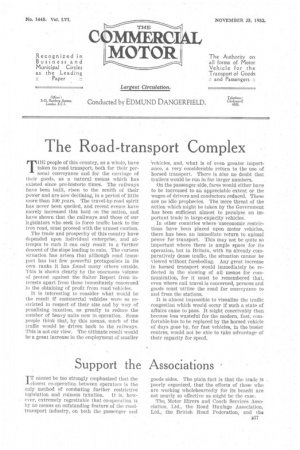The Road-transport Complex
Page 35

If you've noticed an error in this article please click here to report it so we can fix it.
THE people of this country, as a whole, have taken to road transport, both for their personal conveyance and for the carriage of their goods, as a natural means which has existed since pre-historic times. The railways have been built, risen to the zenith of their power and are now declining, in a period of little more than 100 years. The travel-by-road spirit has never been quelled, and recent events have merely increased this hold on the nation, and have shown that the railways and those of our legislators who seek to force traffic back to the iron road, must proceed with the utmost caution.
The trade and prosperity of this country have depended upon individual enterprise, and attempts to curb it can only result in a further descent of the slope leading to ruin. The curious situation has arisen that although road transport has but few powerful protagonists in its own ranks it has found many others outside. This is shown clearly by the enormous volume of protest against the Salter Report from interests apart from those immediately concerned in the obtaining of profit from road vehicles.
It is interesting to consider what would be the result if commercial vehicles were so restricted in respect of their size and by way of penalizing taxation, as greatly to reduce the number of heavy units now in operation. Some people think that, by this means, much of the traffic would be driven back to the railways. This is not our view: The ultimate result would be a great increase in the employment of smaller vehicles, and, what is of even greater importance, a very considerable return to the use of horsed transport. There is also no doubt that trailers would be run in far larger numbers.
On the passenger side, fares would either have to be increased to an appreciable extent or the wages of drivers and conductors reduced. These are no idle prophecies. The mere threat of the action which might be taken by the Government has been sufficient almost to paralyse an important trade in large-capacity vehicles.
In other countries where uneconomic restrictions have been placed upon motor vehicles, there has been an immediate return to animal power for transport. This may not be quite so important where there is ample space for its operation, but in Britain, with its already comparatively dense traffic, the situation cannot be viewed without foreboding. Any great increase in horsed transport would immediately be reflected in the slowing of all means for communication, for it must be remembered that, even where rail travel is concerned, persons and goods must utilize the road for conveyance to and from the stations.
It is almost impossible to visualize the traffic congestion which would occur if such a state of affairs came to pass. It might conceivably then become less wasteful for the modern, fast, comfortable bus to be replaced by the horsed vehicle of days gone by, for fast vehicles, in the busier centres, would not be able to take advantage of their capacity for speed.




































































































